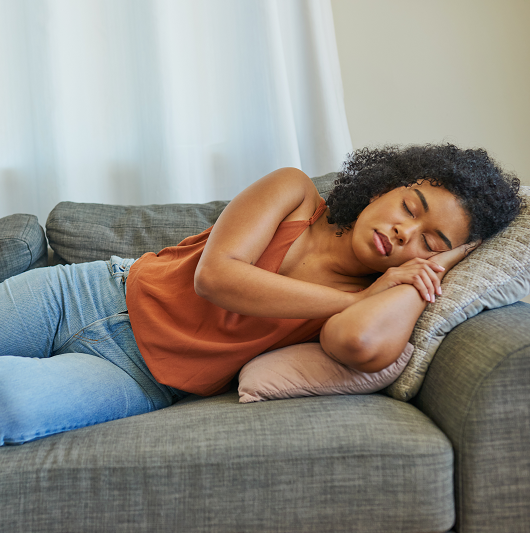How to Fall Asleep Without a Sleep Aid

April 26, 2023
If you’re having trouble falling asleep, you may instinctively reach for a sleep aid. But sleeping pills should only be used occasionally, not as permanent solutions.
Have you forgotten how to fall asleep without sleep aids? It’s possible to relearn habits that should make it easier.
“When you follow healthy habits that encourage sleep, you’re practicing good sleep hygiene,” says Divya Gupta, M.D., neurologist, sleep medicine specialist and medical director at JFK University Medical Center. “Simple lifestyle changes may help you fall asleep naturally, without depending on medication.”
If you’re tired of tossing and turning, adopt some or all of these habits:
Habits to Adopt in the Morning and Afternoon
Things you do early in the day may impact your ability to fall asleep. These habits should make it easier to feel tired at bedtime:
- Wake up at the same time every day, even on weekends. Sleeping in on Saturdays can throw off your whole sleep schedule for the week.
- Curtail your coffee, tea or soda intake at lunchtime or earlier. Caffeine may affect you for hours, making it harder to feel tired at bedtime.
- Get at least 30 minutes of moderate-intensity exercise every day. Physical activity should help you destress and encourage sleepiness at night.
- Avoid napping, even if it feels good at the moment. You’ll lower your sleep drive, which makes it harder to feel tired at night.
Habits to Adopt in the Evening
Embrace habits that won’t keep you up when you want to go to sleep:
- Have an early dinner, so you finish eating 2 to 3 hours before bedtime. It’s difficult to fall asleep shortly after eating a big meal.
- Steer clear of alcohol, if you’re having sleep problems. Some people nod off easily when they drink, but alcohol disrupts sleep rhythms.
- Stop using your smartphone, tablet or other screens an hour or two before bed. The blue light emanating from these devices mimics daylight, tricking you into feeling alert.
- Stay out of your bedroom; don’t watch TV or talk on the phone there. You want to associate your bed with sleep and not other activities.
- Consider having chamomile tea sometime after dinner. Some people find that a soothing, warm beverage helps them feel tired at bedtime.
- If your worries keep you awake, write a list about what’s bothering you. Jotting things down should help you put those thoughts on hold until morning.
Habits to Adopt at Bedtime
As your evening winds down, engage in a calming bedtime ritual. You’ll grow accustomed to the routine and feel sleepy when you get started.
These bedtime habits should encourage you to feel sleepy:
- Dim the lights wherever you are spending time
- Take a quick, warm shower if it relaxes you but avoid long hot baths
- Listen to soothing, calm music
- Read a book with paper pages (not a cell phone or tablet) by lamplight
It helps if you:
- Go to bed at the same time every day, even on weekends
- Keep your bedroom cool and dark
- Have earplugs or a white-noise machine handy, if your partner snores
What to Do if You Can’t Fall Asleep
If you can’t fall asleep after 20 or 30 minutes and you feel frustrated:
- Get out of bed, and go to a dimly lit room
- Read a book with paper pages until you start to feel sleepy, or
- Listen to calm, soothing music for a while until you start feeling sleepy
- Avoid using electronic devices in bed
If none of these solutions work, find a sleep medicine specialist. They may diagnose a sleep disorder or help treat your insomnia.
“If you are regularly using a sleep aid to fall asleep, just remember the above behavioral practices may take some time and persistence before you start to feel the effects, so stay with the healthy sleep habits,” adds Dr. Gupta. “It could take anywhere from ten days to a few weeks before the routine takes effect and enables you to wean off your sleep aid.”
Sleep psychologists along with sleep medicine specialists may also offer cognitive behavioral therapy for insomnia. This research-proven solution helps change your thoughts and behaviors so you can rest.
Next Steps & Resources:
- Meet our source: Divya Gupta, M.D.
- To make an appointment with Dr. Gupta, or a doctor near you, call 800-822-8905 or visit our website.
The material provided through HealthU is intended to be used as general information only and should not replace the advice of your physician. Always consult your physician for individual care.






